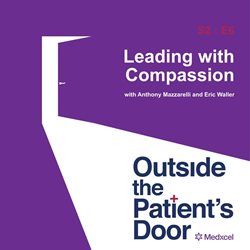(6/6/2022)
Compassion is a critical part of patient care, and its benefits extend far beyond the patient. Eric Waller is Medxcel’s Vice President of Field Support Services and has seen compassion at work firsthand throughout his career.
It’s not just anecdotal evidence.

Anthony Mazzarelli, CEO of Cooper University Healthcare, together with a colleague compiled every article that dealt with compassion in healthcare. What they ultimately found were the overall effects of compassionate care on health (the impact on patients and their health outcomes), healthcare (the impacts on costs and of running healthcare facilities), and healthcare providers (the impact on those that actually provide care).
They call it “Compassionomics,” and the takeaway is simple: Compassion in healthcare is non-negotiable.
From a scientific perspective, compassion has positive effects on both patient and provider experiences. In a study of compassion in healthcare, Duke University researchers found that taking the time to bond with patients and creating a compassionate connection led to improved health outcomes for patients and beneficial experiences for providers. We caught up with Eric Waller and Anthony Mazzarelli in our latest episode of
“Outside the Patient’s Door" to hear about how they have seen compassion play a major role in the patient experience.
Improved outcomes for patients
Overall, compassionate patient care was found to lead to improved long-term health outcomes in every specialty of healthcare.
For the common cold, for instance, bonding between patients and those providing care led to a decrease in cold duration and symptom severity. On the other end of the spectrum, trauma patients’ connections with their providers was the highest predictor of how well they were doing 12 months after discharge. That means a physician’s empathy and compassion meant more to the patient than how long they were in the hospital and the severity of their injury. It meant more than almost anything else.
Connections patients have with their physicians affect other recovery efforts outside of the hospital. Patients are much more likely to be adherent to their medication regimen if they have that connection with their physician.
Positive experiences for providers
Working in a hospital is not always easy. It’s not a nine-to-five job where you can clock out and it all goes away. Compassion is what drives providers to sign up for a job with long hours and serve some of our most vulnerable population.
This has been especially true during the COVID-19 pandemic. Even as Medxcel facilities were trying to identify this new illness and how to treat it, nobody ran from it. Nobody said, “This is not what I signed up for.” Instead, everybody put on their personal protective equipment, did their job, and went above and beyond to make sure everyone felt comfortable.
When you know you’re making a difference to someone, even if the action does not change the outcome of the situation, there is a positive benefit to the caregiver. If you don’t feel like you’re making a difference or relieving suffering, that can instead lead to burnout. Compassion should extend beyond patients. Compassion for co-workers can help remind each member of the team that the work they are doing matters.
Compassion as a facility-wide core value
Compassion should be encouraged for all associates in healthcare. Managers should encourage their employees to look for opportunities to provide compassion so they can impact people's day in a positive way, whether coworkers, patients or anyone visiting a facility.
Managers should create meaningful connections by taking the time to bond with their associates, ask open-ended questions and thank them whenever possible. This will help foster a culture of compassion and ensure everyone feels empowered to go above and beyond to act on empathy.
There is much more to say about the science of compassion and the benefits it provides to patients, caregivers, healthcare facilities, and everyone who visits them. Listen to Season 2 Episode 6 of
“Outside the Patient’s Door,” available on Apple Podcasts, Google Podcasts and Spotify, to hear more stories of compassion from Eric Waller and even more evidence of compassionomics from Anthony Mazzarelli.
Want to learn more about Medxcel? Contact us at
info@medxcel.com or 855-633-9235.